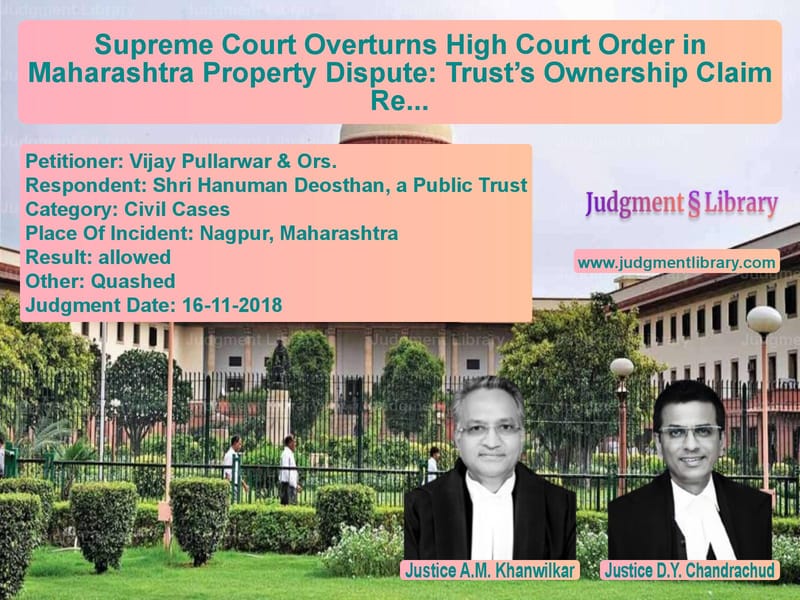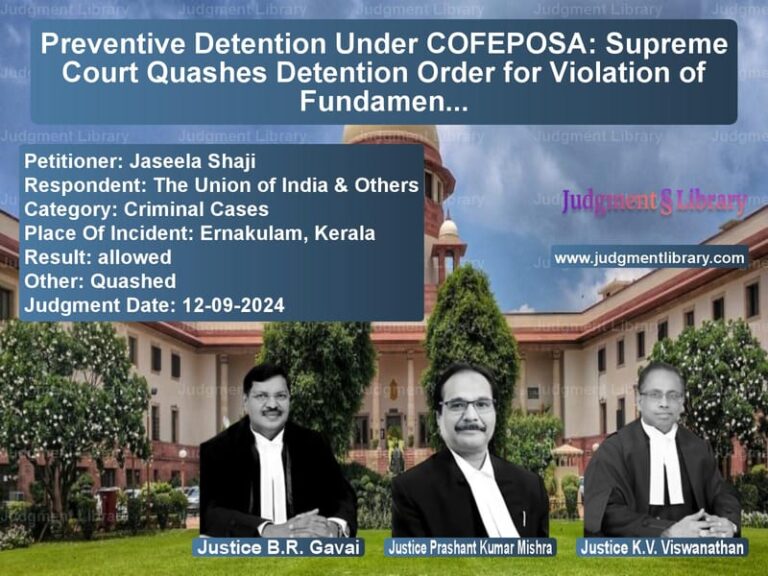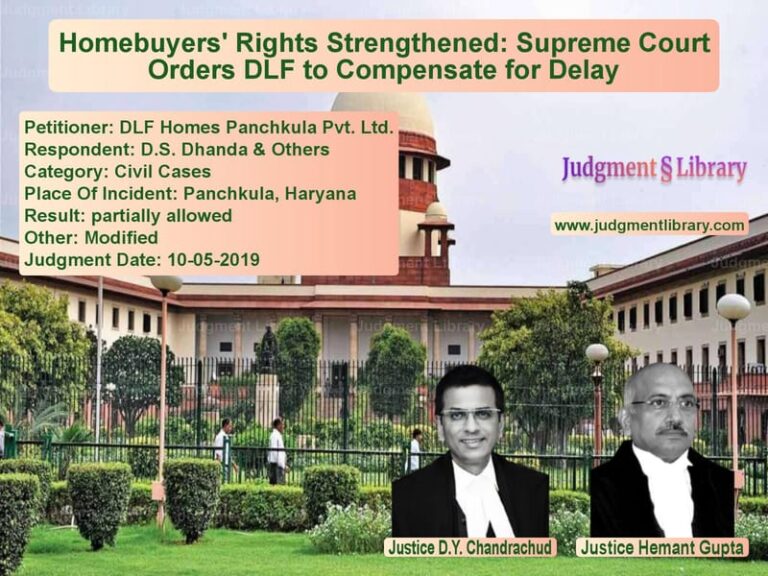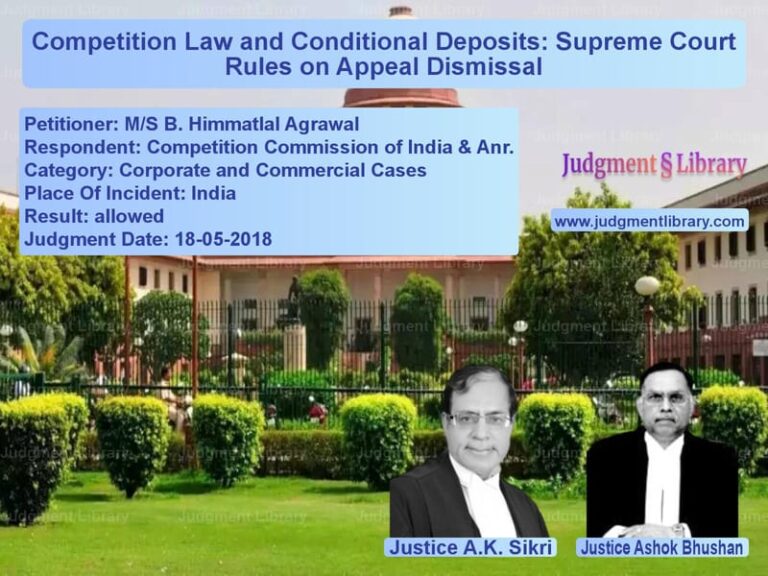Supreme Court Overturns High Court Order in Maharashtra Property Dispute: Trust’s Ownership Claim Rejected
The case of Vijay Pullarwar & Ors. vs. Shri Hanuman Deosthan, a Public Trust was a significant legal battle concerning a property dispute in Maharashtra. The Supreme Court was called upon to decide whether a public trust could claim ownership over a property that had been in the possession of the appellants for over 30 years. The case involved complex legal issues, including the interpretation of the Maharashtra Public Trusts Act, 1950, and the burden of proving ownership in civil disputes.
The appeal was filed by the original defendants, challenging a judgment by the Bombay High Court’s Nagpur Bench. The High Court had restored a trial court’s decree, which had ordered the appellants to vacate the disputed property. The Supreme Court, after carefully reviewing the evidence and legal principles, overturned the High Court’s order and ruled in favor of the appellants.
Background of the Case
The respondent, Shri Hanuman Deosthan, is a public trust registered under the Maharashtra Public Trusts Act, 1950. The trust filed a civil suit in 1978, seeking possession of a property in Nagpur, Maharashtra, which was occupied by the appellants. The trust claimed that the property belonged to the deity Shri Hanuman and was being managed by the trustees. It was alleged that the appellants had no legal right to occupy the premises.
The appellants, however, contested the suit, arguing that they had been in uninterrupted possession of the property for over 30 years. They denied the trust’s ownership claim and asserted that the property was never registered as a trust property under the Public Trusts Act.
Arguments by the Petitioners (Appellants)
- The trust had failed to produce any documentary evidence proving that the disputed property was part of its registered assets.
- The appellants and their predecessors had occupied the property continuously and had been maintaining it for decades.
- The property was never listed in the official records as belonging to the trust, and the appellants had been paying municipal taxes on it.
- The High Court wrongly assumed that the property was misdescribed in the trust’s records without any substantive proof.
Arguments by the Respondents (Trustees of Shri Hanuman Deosthan)
- The property had been used for religious purposes and belonged to the deity, with the trustees acting as custodians.
- The appellants were occupying the property without any legal title and should be evicted.
- The trust had been managing the property for decades, and the appellants were merely caretakers.
- The trial court had correctly ruled in favor of the trust based on its historical management of the property.
Supreme Court’s Judgment
The Supreme Court, after thoroughly reviewing the evidence and legal principles, ruled in favor of the appellants. The key findings of the Court were as follows:
- The trust had failed to produce any concrete documentary evidence establishing its ownership over the disputed property.
- The property was not listed in the trust’s registered assets under the Maharashtra Public Trusts Act.
- The appellants had been in continuous possession of the property for over 30 years and had been maintaining it without any interference from the trust.
- The High Court had wrongly assumed that the property description in the trust’s records was erroneous, without any substantial proof.
- “The plaintiffs/respondents must establish their title to the suit property, and if they fail to do so, they cannot succeed merely by questioning the title of the defendants/appellants.”
- The suit filed by the trust for possession was without merit and deserved to be dismissed.
The Court observed:
“The plaintiffs/respondents were primarily obliged to establish their title in the suit house. The plaintiffs must succeed or fail on the title they establish; and if they fail to do so, they must fail to get the relief of possession irrespective of the title of the defendants in the suit property.”
Conclusion
The Supreme Court’s decision in this case reaffirms the principle that ownership claims must be backed by strong documentary evidence. The ruling highlights the importance of property registration under the Public Trusts Act and ensures that long-standing occupants cannot be displaced without due legal process.
This judgment sets a precedent for future property disputes, emphasizing the need for clear and convincing proof of ownership before courts can order eviction. By overturning the High Court’s order, the Supreme Court reinforced the legal principle that possession alone does not establish ownership, but a party claiming ownership must conclusively prove its title.
Petitioner Name: Vijay Pullarwar & Ors..Respondent Name: Shri Hanuman Deosthan, a Public Trust.Judgment By: Justice A.M. Khanwilkar, Justice D.Y. Chandrachud.Place Of Incident: Nagpur, Maharashtra.Judgment Date: 16-11-2018.
Don’t miss out on the full details! Download the complete judgment in PDF format below and gain valuable insights instantly!
Download Judgment: Vijay Pullarwar & Or vs Shri Hanuman Deostha Supreme Court of India Judgment Dated 16-11-2018.pdf
Direct Downlaod Judgment: Direct downlaod this Judgment
See all petitions in Property Disputes
See all petitions in Landlord-Tenant Disputes
See all petitions in Specific Performance
See all petitions in Judgment by A M Khanwilkar
See all petitions in Judgment by Dhananjaya Y Chandrachud
See all petitions in allowed
See all petitions in Quashed
See all petitions in supreme court of India judgments November 2018
See all petitions in 2018 judgments
See all posts in Civil Cases Category
See all allowed petitions in Civil Cases Category
See all Dismissed petitions in Civil Cases Category
See all partially allowed petitions in Civil Cases Category







